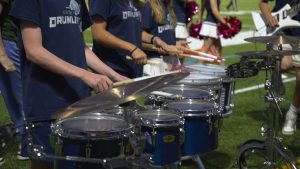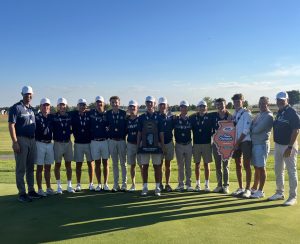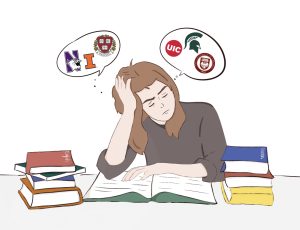Code of Conduct enforced 365 days a year
Administration looks at individual actions to determine punishment
February 10, 2017
Three strikes and you’re out doesn’t only apply to baseball. The Extracurricular Code of Conduct, which is in effect 24 hours a day, seven days a week and 365 days every year, is administered by the Student Activity Coordinators to every athlete, student club leader, and performing arts member.
Despite its governing effect, not many students are aware of the Code of Conduct and its jurisdiction. The Code of Conduct is found in the NTHS guidebook and, “seeks to foster the health, safety, and welfare of participants and promotes high standards of conduct, citizenship, and good decision-making.”
Junior and performing arts participant Sally Kozminski said, “The student code of conduct is necessary for extracurricular activities, even if it is not mentioned very often. In theatre specifically, the code is not brought up much because our teachers and directors assume that we as students are aware of the code’s rules and consequences, but in case they are needed, they can be reiterated easily.”
While not everyone may agree, junior rower Josephine Olson said, “It is unrealistic for the code to be 365 days a year. Since kids see it as just another rule that no one follows or enforces, it is not taken very seriously. If we changed the wording to focus on in season violations and then seriously enforced the rule, we would have a lot less people ignoring the code of conduct.”
Student Activities sponsors, coaches and directors all enforce the Code of Conduct and make sure students stay in line.
“All extracurricular leaders get notifications of Saturday school and things like that, any disciplinary issue. We get those notifications in emails from the advisor chair offices and the assistant principle,” Student Activities Coordinator, Stacy Kolack said.
Violations include substance abuse, truancies, failing classes, and vandalism. Director of Student Life Athena Arvanitis said, “Of all of our infractions, the biggest ones that you hear about are substance abuse and academic integrity.”
Code violations, or infractions, are found out in a number of ways. “If it’s completely out of school, we get information all sorts of ways. Any extracurricular leader has the obligation to investigate and to do their diligence to figure out what the context was and what happened,” Kolack said.
The standard for violations is that first violations can get you suspended from each activity for up to 25% of that season or the time available of participation. Severe violations can lead to longer suspensions. During a student’s suspension, they can attend their club’s meetings or try out for a sport but they cannot participate in club or athletic events.
Performing Arts is a little different. The guidebook states “a student’s participation during the suspension will be determined by the Performing Arts Coordinator in accordance with the specifics of the performance opportunity.” But the suspension from the code violation will not carry over to the next show or production.
The second violation can lead to 50% suspension of the time allotted for the extracurricular activity. The same rules for participation apply as the first code violation. While the third violation can mean that students cannot participate at all for the rest of their high school career.
However, Kolack stressed that most code violations consequences are case by case and depend on the student coordinator. Most violations will not carry over into the remainder of a student’s high school career.
Like with state and federal laws, students and parents can appeal the consequences given. When a family appeals the decision, the principal, superintendent, and assistant principal can get involved, said Arvanitis.
The Code of Conduct was created to help students. Arvanitis said, “Kids make mistakes. It’s all a part of growing up and being a teenager in high school. But how do we create moments where we can create moments with the student, come to some common understanding on why some behaviors are not sought after or how they could make better decisions and then move forward from there. It’s not about the penalty, it’s about working with the student.”











































